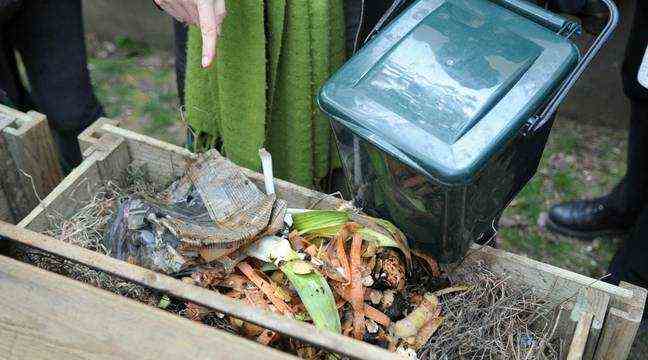It’s not that we’re in a hurry, it’s that it’s urgent! No, we’re not already talking about Christmas presents to prepare, but organic waste to sort. Because, and it is not well known, the Agec law of 2020
provides that before December 31, 2023 everyone will have to sort their bio-waste. According to the Environment code, these group together “non-hazardous biodegradable garden or park waste. [et] food or kitchen waste. »And two years, it goes fast! Especially for communities which must set up this specific sorting and the inherent collection.
“In Paris, the good news is that we are not starting from scratch, reassures Colombe Brossel, assistant to the town hall in charge of waste management. We are continuing to put in place all of the
compost plan 2016-2020. We have deployed a thousand collective composters at the foot of buildings or in collective buildings, distributed 5,000 vermicomposters for individuals. »In addition, there is composting in collective gardens, most often provided by associations.
Door-to-door collection in slow motion
“We are still in the experimental phase of the collection, recognizes the elected representative. The objective is twofold: to test all forms of devices and to be based on the uses of Parisians. »For Mélisande Seyzériat, general coordinator of the Zero Waste Paris association, it would be necessary to move quickly to the next step and to put a blow on the accelerator: “it skates, we find that it goes rather slowly”. “We will not be at a total sorting of bio-waste at the source before the end of 2023,” she judges. It’s badly embarked. “
It regrets in particular that the experimentation of door to door collection, via brown trash cans, launched between 2017 and 2019 in the 2nd, 12th and 19th arrondissements has not already been extended. However, this is not quite the order of the day, according to the municipality. “We will take stock at the end of 2022, because we are still in the experimentation phase”, indicates Colombe Brossel. Due to the density of housing, “in the 19th arrondissement, we were only able to equip 60% of the buildings with a collection bin, due to lack of space. So how do you sort the bio-waste from the remaining 40%? “To these difficulties is added the confinement during which the collection suddenly stopped. “It took a lead in the wing”, notes Mélisande Seyzériat, joined, on this point, the deputy mayor of Paris who wants to “relaunch the dynamic” through information campaigns. Or very concretely, by visiting buildings that no longer take out their brown trash on collection day.
Towards fixed containers?
At the same time, the town hall wants to increase the number of voluntary supply terminals for bio-waste and “build this strategy step by step for depositing food waste”. “We have forged partnerships with schools so that they take them in so that parents can drop off their waste at the same time as their children,” says Colombe Brossel. Bins have also been deployed in the Parisian markets, with mixed results for the coordinator of Zero Waste. “It’s a disaster,” she alarms herself. These are little differentiated bins made available to everyone and there are frequently cups and papers. In a market near Les Halles, I even spotted a collection bin full of hangers! “
If the elected official recognizes problems in “four or five markets”, she generally welcomes “the good quality of waste”, essential for their recovery. The municipality has also tested the installation, near covered markets, of containers for food waste. A conclusive experience which “makes it possible to leave compost containers in the street”, as can be the case for glass. Finally, the town hall “is working on the town’s capacity to collect all food waste from collective catering from administrations and school groups”. But for implementation in 2024 …
Disturbing figures
The problem is that we are starting from very low. According to municipal data, in 2019, 5,000 tons of food waste were collected. Knowing that they represent around 25% of the total garbage produced by a Parisian household and that “every day, 3,000 tonnes of waste are collected »In Paris, 750 tonnes of food waste should be collected daily, or more than 270,000 tonnes over a year. Sacred hiatus! Especially since it is not just a question of regulation, recalls Mélisande Seyzériat. “Incinerating bio-waste, which is made up of 80% water, is a major loss of energy, and putting it in landfill releases methane into the atmosphere and the decomposition in the middle of other waste creates” juice trash ”which infiltrates and contaminates the soil. ” Charming.
Finally, the ultimate pitfall, what do we do with the collected bio-waste? Ideally, they are sent to a methanizer where they are transformed into biogas and digestate, intended to fertilize the soil. Except that “the waste methanization sector is not yet in place”, deplores Mélisande Seyzériat. Fortunately, Syctom, which manages waste in Ile-de-France has planned to build one in Gennevilliers. Delivery expected: not before the end of 2024. Almost on schedule.

